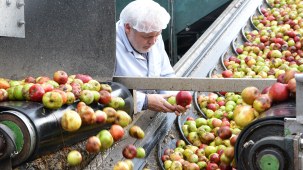At the birthplace of apple juice

From purely statistical terms, one in ten glasses of apple juice that is drunk in Germany comes from Eisleben. The town has developed into a stronghold of the tasty beverage in recent years. Adam and Eve would have enjoyed it. After all, the German per capita consumption of the drink is 8.4 litres a year.
The premises of Becker Eislebener Fruchtsaft GmbH & Co. KG. are at their busiest period during autumn. Huge trucks deliver apples every half hour. The harvest this year is outstanding. "We have our hands full trying to press a part of it as quickly as possible", says managing director Ulrich Günther. But the presses will continue to run in the coming months. The season is almost always like this since the supply from the cold storage is also ensured to continue.
But why just Eisleben? Ulrich Günther explains about the growing tradition of the site. There were apple trees as far as the eye could see in the area around the town by the lake Süßer See during the GDR era. The town ran its own fruit juice production plant since the mid-1980s. In the GDR, orange juice and local fruits were in short supply. Most small cider producers in the state could not meet the demand. Those who could hand in fruit from their own garden and then receive the equivalent back in pressed form were lucky. At that time, raw juices from Eisleben were exported to West Germany and helped to fill the currency accounts of the German Democratic Republic.
beckers bester GmbH & Co fell back on this potential of experience and decided to purchase the operation as well as the construction of the completely new production facilities. From then on beckers bester relied on juices from Saxony-Anhalt. In connection with necessary restructuring measures on the premises of beckers bester, the production facility in Eisleben was sold to a new owner. "As a more economically viable and therefore securer location, we did not have to worry about the future", says the managing director. The fruit juice production plant has been continually developed since the early 1990s.
The food industry in Saxony-Anhalt has now established itself as the strongest sector of the manufacturing industry in the state. It primarily focuses on regional production. The expansion of organic products plays an increasingly important role. The companies in the industry in Saxony-Anhalt have stabilised and continuously developed since the mid-1990s. Revenue in food and animal feed production has increased by 5.6 percent in 2013 compared to the previous year to almost 7.16 billion euros. Approximately 21,800 people are employed in the 172 companies in the food and beverage industry of the state.
The beverage experts from beckers bester in Eisleben have relied primarily on stable and high-quality supplies of fruits from the neighbouring regions of Central Germany from the beginning. From the uncertainty about the prospects of fruit production after the clearing of almost 3,000 hectares of plantations after 1989, the situation has stabilised considerably. "The experience and favourable growing conditions were important for us", explains Ulrich Günther. Agreements were made with suppliers from Saxony-Anhalt, Saxony and Thuringia to secure the purchase of the accumulating fruit for processing. At the same time, the partners agreed to plant special varieties that are essential to juice production. becker guarantees these companies the purchase of a maximum of 10,000 tonnes of apples on fixed terms. Overall, the site in Eisleben processes an annual average of 60,000 tonnes of fruits, with up to 60 percent from Central Germany.
becker in Eisleben is one of the three major processing plants for juices in Germany. On average, around 55,000 litres are produced each year. Apple juice accounts for almost 90 percent of the total production. The product range also includes cherries, blackcurrants and rhubarb among other fruits. Fruit purees complete the production range. Apple pomace is also dried and sold as a food additive, such as for teas or pectin. The share of organic products is now around twelve percent. Buyers of the juices are bottling plants all over Germany. With an export share of 35 percent, France, Britain, Spain and the Benelux countries also rely on suppliers from Saxony-Anhalt.
Almost 35 million euros has been invested in Eisleben since 1993. 2.6 million euros were invested in the expansion and modernisation of the company in 2013 alone. "After many years, an update was practically necessary", explains Günther. After all, we always want to be up to date both technically and hygienically. For the time being, another 1.7 million euros will be invested in the expansion of the loading and storage capacity by 2016. The state of Saxony-Anhalt also supports the site with funding.
Four of the 45 employees are trainees. They all have the option of assuming a position on completion of their training. The company intends to qualify its professionals itself, says Günther.
Author/Foto: Klaus-Peter Voigt on behalf of IMG Saxony-Anhalt
Contact:
Ulrich Günther
becker - Eislebener Fruchtsaft GmbH & Co. KG
Alleebreite 14-15
06295 Lutherstadt Eisleben
Phone: +49 (0)3475 75110
E-Mail: info.ignore@becker-eisleben.de
www.becker-eisleben.de
